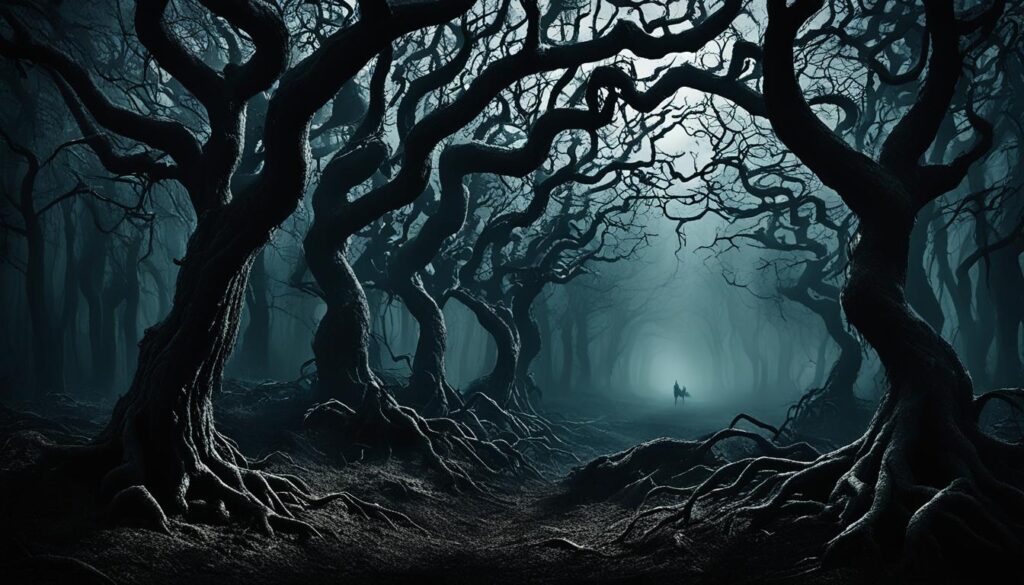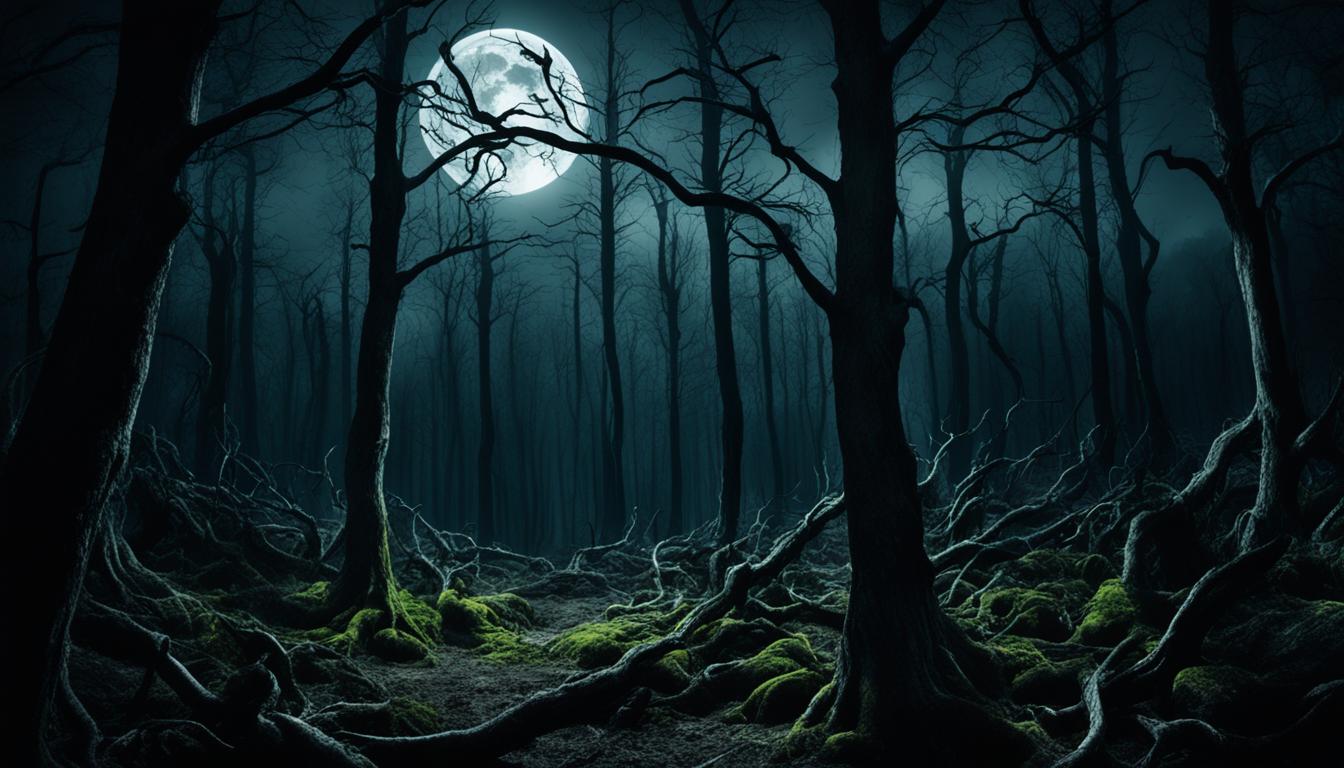If you’re a fan of horror, chances are you’ve heard of Stephen King. His name is synonymous with terrifying tales that plunge readers into the chilling depths of fear. King’s masterful storytelling and iconic tales have earned him a place as one of the most renowned authors in the horror genre. In this article, we’ll take a closer look at the world of horror that King has created and explore what has made his works so enduringly popular.
Key Takeaways:
- Stephen King is a master of horror with a reputation for crafting spine-chilling tales.
- His early influences, career milestones, and impact on popular culture have made him one of the most renowned and influential horror writers of all time.
- King’s iconic novels, short stories, and monsters have left an enduring mark on the horror genre and popular culture.
- Through his storytelling, King has explored psychological horrors and elevated the genre to new heights.
- King’s enduring legacy lives on, inspiring future generations of horror writers and readers alike.
Stephen King’s Early Influences and Beginnings
Stephen King’s journey into the world of horror was shaped by his early influences and experiences. Growing up in rural Maine, King was exposed to the dark and atmospheric settings that would later become the backdrop for many of his iconic works.
King’s interest in horror began at an early age, with his fascination for comics and pulp magazines like “Tales from the Crypt” and “Black Mask.” These early literary inspirations, along with his love for the classic horror films of the time, set the tone for King’s future endeavors in the genre.
Throughout his adolescent years, King continued to develop his storytelling skills, often experimenting with horror tales and suspenseful narratives. It wasn’t long before he began submitting his work to various publications, earning his first professional sale at just 18 years old.
Inspired by the works of H.P. Lovecraft, Edgar Allan Poe, and Shirley Jackson, among others, Stephen King began carving his own path in the world of horror literature. His early influences and formative years laid the foundation for what would become a career defined by spine-tingling storytelling.
The Rise of Stephen King as a Master of Horror
Stephen King’s journey into the horror genre began in the early 1970s, with the publication of his debut novel, Carrie. As the world began to take notice of his unique style and storytelling, King quickly established himself as a master of horror, dominating the literary landscape with his spine-chilling tales.
One of the defining moments in King’s rise to fame was the publication of The Shining in 1977, which solidified his status as a cultural icon. As his popularity grew, King continued to push the boundaries of the horror genre, crafting unforgettable characters and exploring the darkest depths of the human psyche.
Throughout the 1980s and 1990s, King’s dominance in the world of horror continued to reach new heights. With each new release, he captivated readers with his vivid imagination and masterful prose. By the turn of the millennium, King had become one of the most renowned and influential writers of all time, with a legacy that continues to inspire generations of horror lovers.
King’s rise to become the master of horror is a testament to his unwavering dedication to the genre, his exceptional writing skills, and his unparalleled imagination. His enduring influence on the world of horror is a testament to the lasting impact of his unique vision and storytelling abilities.
Iconic Stephen King Novels and Their Impact
Stephen King’s impact on the literary world is undeniable, and much of that can be attributed to the unforgettable novels he has penned over the years. From the iconic “Carrie” to the haunting “IT” and the spine-chilling “The Shining,” King has crafted stories that have resonated with readers for decades.
King’s novels have not only had a significant impact on the horror genre but also on popular culture as a whole. The memorable characters and terrifying plotlines continue to inspire adaptations, sequels, and spin-offs in various forms of media, including film, television, and video games.
With over 60 novels to his name, King has proven to be one of the most prolific and influential authors of our time. His works have entertained and terrified millions of readers and left an indelible mark on the world of literature.
The Enduring Legacy of Stephen King’s Iconic Novels
The impact of Stephen King’s novels is felt far and wide, with his iconic characters and stories embedded in popular culture. From Jack Torrance’s descent into madness in “The Shining” to the telekinetic powers of Carrie White, King’s creations have become a part of our cultural lexicon.
King’s writing style, which blends horror and suspense with elements of psychological horror, has inspired countless authors in the horror genre. His iconic works have become touchstones for aspiring writers aiming to craft gripping and unforgettable tales that leave readers on the edge of their seats.
Moreover, his stories continue to be adapted for the big and small screen and have become staples of movie and television horror. King’s impact on the horror genre and popular culture is undeniable, and his legacy will undoubtedly endure for years to come.
Stephen King’s Villains and Monsters
Stephen King is known for his masterful storytelling when it comes to horror, which includes some of the most terrifying villains and monsters to ever grace the pages of literature. In his novels, he has created an array of creatures and characters that have become synonymous with his name. From the shape-shifting entity of Pennywise the Dancing Clown in “It” to the demonic prophet Randall Flagg in “The Stand,” King’s villains and monsters are an essential part of his work. These creations tap into our deepest fears and make us question what truly lurks in the shadows.
One of King’s most iconic monsters is the otherworldly canine creature, Cujo, who terrorizes a mother and son trapped in a car. Another favorite among fans of Stephen King’s work is the pet cemetery that brings dead animals back to life, which eventually leads to the resurrection of humans. The unsettling creatures from the “The Mist” are a firm favorite, where he created monsters that mix the banal with the outright bizarre.
One of the recurring themes in Stephen King’s works is his ability to create fear out of the ordinary. Many of his monsters started off as everyday objects or events before taking on a more sinister form. This technique has made Stephen King’s writing stand out and helps elicit terror in his readers.
The image below showcases some of the most memorable villains and monsters created by Stephen King:

By crafting unforgettable villains and monsters, King has showed us that in his works, sometimes the scariest thing is not what we can see but what we cannot.
Stephen King’s Impact on Horror Cinema
Stephen King’s influence on horror cinema is undeniable. Many of his novels and short stories have been adapted for the big screen, with varying degrees of success. However, even the less successful adaptations have contributed to the enduring legacy of King’s works and his impact on the horror genre.
One of the most iconic adaptations is “The Shining,” directed by Stanley Kubrick and starring Jack Nicholson. The film is often cited as one of the greatest horror movies ever made and has cemented its place in popular culture. The iconic imagery of Nicholson’s character, Jack Torrance, peering through a cracked door and uttering the chilling phrase, “Here’s Johnny!” has become a cultural touchstone.
Another notable adaptation is “Carrie,” directed by Brian De Palma. The film starred Sissy Spacek as the titular character and explored themes of bullying, revenge, and telekinesis. The film received critical acclaim and has become a cult classic, inspiring numerous adaptations and references in popular culture.
Other notable adaptations include “It,” “Misery,” “Pet Sematary,” and “The Shawshank Redemption,” which was adapted from King’s novella “Rita Hayworth and Shawshank Redemption.”
King’s impact on horror cinema extends beyond direct adaptations of his works. Elements of his storytelling techniques and themes have influenced countless horror films, even those that are not direct adaptations. His focus on creating complex characters and exploring the psychological depths of fear has become a hallmark of the horror genre.
In conclusion, Stephen King’s impact on horror cinema is significant and enduring. His works have inspired countless adaptations and influenced the horror genre as a whole. From iconic adaptations like “The Shining” and “Carrie” to the more subtle influences on the genre, King’s impact will continue to be felt for years to come.
Psychological Horrors in Stephen King’s Writing
Stephen King’s writing is not limited to jump scares and macabre creatures. His masterful storytelling introduces readers to a world beyond the mundane, where psychological torments take center stage. King weaves intricate narratives that delve into the darkest corners of the human mind, exploring the themes of grief, trauma, addiction, and mental illness.
Through his characters, King creates portraits of individuals struggling to come to terms with their inner demons. For example, in “The Shining,” King portrays the psychological deterioration of protagonist Jack Torrance as he grapples with addiction and insanity in the isolated and haunted Overlook Hotel. Similarly, in “Misery,” he delves into the twisted mind of a deranged fan who holds an author captive, inflicting physical and emotional torture to keep him writing.
King’s deep exploration of the human psyche elevates his writing to a new level, one that transcends the horror genre and delves into a deeper understanding of human nature and the human experience. The horrors that King writes about are not confined to the supernatural but are rooted in the very real and relatable struggles of the human condition.
In conclusion, Stephen King’s psychological horrors leave a lasting impact on readers, long after the final pages have been turned. His ability to capture the intricate workings of the human mind has cemented his place as one of the most influential writers of our time.
Stephen King’s Short Stories and Anthologies
While Stephen King is perhaps best known for his epic horror novels, his genius is also evident in his compelling short stories and anthologies. The master storyteller has the ability to craft complete worlds in a few short pages, leaving readers feeling as though they have experienced an entire universe in condensed form.
The Bazaar of Bad Dreams
One of Stephen King’s recent collections, The Bazaar of Bad Dreams, is a testament to his mastery of the form. This anthology features 20 short stories, each with its unique plot and characters. From the chilling “Bad Little Kid” to the haunting “A Death”, these gripping tales showcase King’s versatility and ability to draw readers in from the first sentence.
Night Shift

Another celebrated anthology of Stephen King’s short stories is Night Shift. Originally released in 1978, this collection features some of King’s earliest published works, including “Children of the Corn” and “The Lawnmower Man.” These stories went on to inspire numerous films and adaptations, cementing King’s status as a cultural icon in the horror genre.
Whether it’s through anthologies or standalone stories, Stephen King’s short works are a treasure trove of terror and awe. They’re perfect for fans of the horror genre who are short on time, allowing them to experience the full scope of King’s unmatched storytelling prowess in bite-sized chunks.
Stephen King’s Influence on Future Generations of Horror Writers
Stephen King’s impact on horror literature has been immense, and his influence on future generations of horror writers is indisputable. King’s ability to craft compelling narratives and memorable characters has inspired a new wave of horror storytellers to push the boundaries of the genre.
Many writers have cited King as a major influence on their work, including the likes of Joe Hill, Neil Gaiman, and Gillian Flynn. His storytelling techniques, such as the use of strong imagery and compelling dialogue, have become staples of the horror genre and have been emulated by countless writers.
Additionally, King’s iconic characters, such as Pennywise and Jack Torrance, have become cultural touchstones and remain relevant to this day. Whether it’s through film adaptations or new works of fiction, King’s influence can be seen across all aspects of horror storytelling.
In short, Stephen King’s enduring impact on the world of horror literature has not only cemented his status as a master of the genre but has also inspired a new generation of writers to continue pushing the boundaries of what is possible in horror storytelling.
Exploring the Stephen King Multiverse
Stephen King’s universe is vast and complex, with interwoven narratives that span across different novels and stories. Known as the ‘King Multiverse,’ this intricate web of tales features overlapping characters, settings, and themes that connect various works together.
Through careful analysis and attention to detail, readers have uncovered numerous connections and Easter eggs hidden within King’s works, only adding to the richness of his multiverse. References to events and characters from other books, overlapping themes and motifs, and even alternate realities all contribute to the intricate world-building that King has created.
One of the most notable examples is the appearance of the enigmatic figure known as the “Man in Black” throughout several of King’s works. From his role as the main antagonist in “The Stand” to his appearance as a crucial character in “The Dark Tower” series, this recurring figure ties various narratives together and adds to the overall complexity of the multiverse.
As we continue to explore Stephen King’s world of horror, we’ll unravel the threads that connect various works and delve deeper into the intricacies of his multiverse. But be warned – once you enter this dark and twisted world, there’s no turning back.
Stephen King’s Enduring Legacy
Stephen King’s legacy in the horror genre is one that has stood the test of time. His masterful storytelling and unforgettable characters have captivated audiences for decades, and his influence can be seen in countless works of literature and cinema.
Over the years, King has received numerous accolades for his contributions to the world of horror and literature as a whole. He has won multiple Bram Stoker Awards, World Fantasy Awards, and even an O. Henry Award for his short fiction.
But King’s impact extends far beyond the literary world. His stories have had a profound cultural impact, becoming ingrained in our collective consciousness and shaping the way we think about horror. His iconic villains, such as Pennywise the Dancing Clown and Jack Torrance, have become cultural touchstones, inspiring countless imitations and adaptations.
King’s influence on contemporary storytelling is undeniable. His impact can be seen in the work of countless horror writers, both established and up-and-coming. His legacy will undoubtedly continue to inspire and terrify future generations of readers and viewers alike.
Embracing Stephen King’s World of Horror Today
The world of horror created by Stephen King continues to captivate and terrify audiences today. King’s masterful storytelling and iconic tales have left an enduring legacy that resonates with readers and viewers alike.
Despite the passage of time, King’s works remain relevant and continue to inspire contemporary horror storytelling. His ability to tap into the deepest fears and anxieties of the human psyche has made his works timeless and enduring.
Today, Stephen King’s world of horror continues to thrive in literature, cinema, and popular culture. His influence can be seen in the works of countless writers and filmmakers who have been inspired by his stories and characters.
Whether you’re a longtime fan or a newcomer to the genre, it’s never too late to embrace the world of horror created by Stephen King. With his rich and diverse body of work, there’s always something new to discover and explore. So why not take the plunge and immerse yourself in the chilling depths of the world of horror today?
FAQ
What is the focus of this article?
This article explores the captivating and terrifying world of horror created by legendary author Stephen King.
What can I expect to learn about Stephen King?
You will learn about Stephen King’s early influences, his rise to become a master of horror, the impact of his iconic novels, his unforgettable villains and monsters, his influence on horror cinema, his psychological horrors, his short stories and anthologies, his influence on future generations of horror writers, his multiverse, and his enduring legacy.
Why is Stephen King considered a master of horror?
Stephen King is considered a master of horror due to his masterful storytelling and his ability to create iconic tales that delve into the chilling depths of fear.
Which novels are considered iconic works by Stephen King?
Some of Stephen King’s iconic novels include “Carrie,” “The Shining,” and many more.
What impact has Stephen King had on the horror genre?
Stephen King has had a significant impact on the horror genre, both in literature and cinema, shaping the genre and inspiring future generations of horror writers.
What are some of the psychological themes in Stephen King’s writing?
Stephen King’s writing often delves into psychological horrors, exploring the complexities of the human mind and elevating the genre to new heights.
What is the Stephen King multiverse?
The Stephen King multiverse refers to the interconnected web of narratives and characters that span across various novels and stories, creating a rich and complex tapestry.
What is Stephen King’s enduring legacy?
Stephen King’s enduring legacy includes his contributions to the horror genre, the cultural impact of his works, and his continued influence on contemporary storytelling.
Why are Stephen King’s works still relevant today?
Stephen King’s works continue to resonate with audiences today because they skillfully tap into universal fears and explore timeless themes and human emotions.



